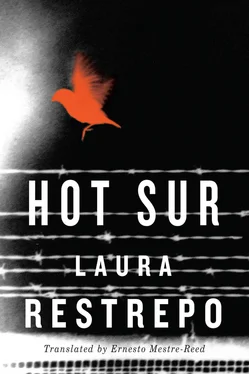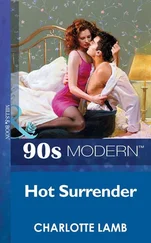I’m so hot, he thought, as he changed his pajamas drenched in sweat. He needed to calm down, find his point of balance again. Best if he left the bedroom, the scene of his nightmare, and went into the kitchen, which was always cooler, with bare feet on the cold tiles, open some windows, refill the dogs’ water dishes, have a nice glass of apple juice with lots of ice. By the time he went back to bed, he was afraid to fall asleep lest the hallucinations begin again, so he put on the television and for the thousandth time watched An American in Paris with Gene Kelly. He fought sleep for another reason as well: he feared that if he fell asleep he’d return to Manninpox, that place that he despised but that was beginning to ensnare him as it had ensnared Cleve. Awake, he could escape its influence, but if he fell asleep, who knows? He’d run the risk of being transported there, as if sleepwalking through the woods, hypnotized, betrayed by his own steps that led toward those porous walls and forced him through them against his will, past the secluded courtyards and through the gloomy hallways that smelled like the circus, a bad combination of urine and disinfectant, as his until recently loyal Taylor & Son boots, in a sudden display of insolence, led him to the very entrails of the place, to its feverish heart, the tight rows of cells, where the feminine breath stuck to the walls like water stains, and where the pride of caged lionesses would be waiting for him, him, Ian Rose, to lick his face and destroy it with one blow. In spite of the apple juice, the nightmares continued, and Rose had no choice but to take the Effexor he had avoided taking that day. He began dozing off around dawn and was sound asleep halfway through Some Like It Hot , another movie he knew by heart. In the end, he did not know how he had been able to defend himself, or what masthead he had held onto to withstand the siren songs of the inmates of Manninpox; but as it was, he awoke late that morning safe in his own bed, or rather he was awakened by the hounding of his dogs, who did not understand why at that hour of the day they had not gone out or been fed breakfast.
Later, while taking a shower, Rose got an idea. Although “idea” isn’t exactly the word, more like the flash of an image that assaulted him along with renewed uneasiness about his years in South America, the solitary figure of a man nailed to a cross. That was it: he knew it immediately. The murder of the policeman had not been a hate crime as the press had asserted. That phrase “racist pig” could have well been on the wall before the murder; such graffiti was likely common in a multiracial and troubled neighborhood like the one in which María Paz lived. It was no wonder the neighbors had been complaining. But the thing with the ex-cop was about something else. It had been a crucifixion without a cross. The wounds on the body were the same as the ones on the crucified Jesus, one on each hand, one on each foot, and one on the side of the torso. Rose knew what the stigmata was because he had learned about it in Bogotá. Rose wasn’t a religious man and had never been interested in such things, but the issue had become a priority the moment that his son, Cleve, then seven years old and likely because of the influence of school lessons in Bogotá, announced that he wasn’t only going to become a Catholic but also a priest. Edith was horrified, one more reason for her to hate Bogotá. But Ian had taken it as a joke. “Do it if you want, son,” he had told Cleve. “It’s your choice. You can be a Catholic if that’s what you want, as long as you don’t become pope.” But when the boy began to swear that he saw the Sacred Heart of Jesus in the bark of trees, Ian Rose realized that the issue was serious and decided to look into it seriously. The Christ that he came to know in the Baroque churches of the colonial center of Bogotá had nothing to do with the fair and incorporeal bourgeois of his Protestant family. This South American Christ was a man of the people, a working-class hero who attracted crowds with his melodramatic confrontations, a poor man who suffered and bled with them, a Lord of the Wounds, a Master of Sorrow, who fascinated crowds with his masochistic displays. Rose grew frightened that his son had been influenced by such mentality, which according to him was extremely twisted, and that was another reason that he did not prevent Edith from taking the child out of Colombia. And now, there in the shower of his house in the Catskills, Ian Rose thought he understood all of a sudden that Greg, the ex-cop, had been murdered by crucifixion, or something like it. The crime had been a ritual murder, that was the essence of it, and not a hate crime as the papers asserted. Why should Rose believe the newspapers anyway? Since when did they know anything? María Paz offered a different version of events, so in a towel and still soaking wet, Rose went to his desk, took out the manuscript, and reread that part a few times. She maintained she was innocent, and her argument was quite convincing. But if that was the case, who the hell had crucified her husband? A gang of wrathful white haters, as the NY Daily News assumed, or some religious fanatics? And what about that gift-wrapped Blackhawk they found in her apartment?
From Cleve’s Notebook
Paz — that’s what María Paz wants to be called. Paz. “Mi Paz,” I wrote the other day. I don’t know why I used the possessive when referring to her, given she’s her own person and no one else’s. “Mi paz os dejo, mi paz os doy,” recited the Colombian priest, and I thought he was saying, “Mis pasos dejo, mis pasos doy,” confusing “peace” with “steps,” but so I repeated at the top of my voice along with the others, feeling as Catholic as any of them. And then there was a very meaningful liturgical chant that was my favorite, dealing with the anxiety of souls, and that in its high notes exclaimed, “Yo tengo sed ardiente, yo tengo sed de Dios.” And the neo-Catholic I was becoming, a zealot like any convert, sang, “Yo tengo seda ardiente.” So I had burning silk instead of a burning thirst, that’s what it sounded like to me, and that’s how I repeated it, kneeling with my eyes closed, racked with emotion, in a complete mystical state, so much so that one day I confronted my parents, who are Protestants, I think, I’m not sure, maybe they’re nothing, but in any case I told them I personally would be a full-fledged Catholic. My mother grew very concerned, but my father simply laughed. And although I never became a Catholic — or, for that matter, a Protestant — I’m still somewhat possessed by the burning thirst and I struggle against the universal tendency to replace the gods of Olympus with the stars of Hollywood. A bad habit, that tendency to demystify. A bad habit for me, I mean, who is a novelist and convinced that the heart of any good novel is nothing more than a camouflaged ritual whose only great concern is forgiveness or condemnation. And all you have to do is dig a little to find the victim and victimizer, the crucified and the crucifier. I also think that its central theme, however varied it may be, always deals more or less with the same thing: guilt and expiation. Just ask Fyodor.
Interview with Ian Rose
Once he was a bit more calm, Ian Rose decided that the only option to overcoming his torment of doubts and shooing away the ghosts was to screw his courage to the sticking place, deal with the irreversible fact of his son’s death, and begin to investigate the not very clear circumstances surrounding it. I’m going to go crazy if I don’t do it, he thought, and they’ll put me in an asylum — and who’ll take care of the dogs then? That’s why at eight o’clock in the morning the following Wednesday, he was ordering orange juice, a cappuccino, pancakes with maple syrup, and fried eggs with sausage at the Lyric Diner, Cleve’s favorite breakfast spot in New York, a fifties-style bar and grill on Third Avenue and Twenty-Second Street.
Читать дальше












